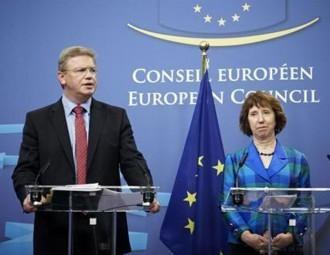Opinion: EU leaders will have to work a lot after the EaP Summit

Current debate on the Eastern Partnership, EU's policy for building closer relations with post-Soviet countries, has largely focused on the Vilnius summit on 28 to 29 November, writes Hrant Kostanyan.
The questions so far addressed mainly relate to the expected deliverables.
Will Ukraine meet the conditions set by the EU for signing the association agreement and the deep and comprehensive free trade pact (DCFTA)?
Will Armenia, Georgia and Moldova manage to initial such agreements?
What is the place of Azerbaijan and Belarus in the post-Vilnius Eastern Partnership?
Will the EU sign visa facilitation and readmission agreements with the former and shift from a policy of sanctions to engagement vis-a-vis the latter?
By way of opposition to the European integration of countries in its "near abroad," Russia is proposing an ambitious project of its own: the Eurasian Union – an alternative to the EaP.
In recent months Russia has used its economic, diplomatic and military influence to try jeopardise the outcome of the Vilnius Summit. A brief trade conflict with Ukraine over the summer was followed by more threats; comments by the former Russian ambassador to Armenia warning Armenians about the dangers of European integration; significant new arms sales to Azerbaijan.
But Russian pressure has been counter-productive so far and the summit is on track to becoming an important milestone.
The Vilnius Summit is expected to take the first major step towards differentiation between the six states in the Eastern Partnership, as promised by Stefan Fuele, the EU commissioner in charge of the European Neighbourhood Policy (ENP) and the EaP.
The summit is set to solidify the growing divide between Armenia, Georgia, Moldova, and possibly Ukraine, one the one side, which form the EaP core, and Azerbaijan and Belarus on the other side, moving ever further toward the EaP periphery.
By initialling association agreements with Moldova, Georgia and Armenia and possibly signing one with Ukraine, the EU seems confident of success in Vilnius.
However, as politically important as this would be, it would mark only the start of a new phase.
The real benefits from these agreements come from their implementation, which, given their comprehensive nature, is expected to take a long time and to cost a lot in terms of political will on both side.
The EU laws that Armenia, Georgia, Moldova and Ukraine are committing to implement amount to the majority of the EU acquis - the EU’s treaties, directives, regulations, declarations, resolutions and the judgments of the European Court of Justice.
In practice, this means that the parliaments of the Eastern Partnership countries will need to set a rigorous schedule for adopting laws.
Civil society - pro-democracy and human rights NGOs but also professional organisations, consumers and producers associations and trade unions - will have a big role to play.
The European Commission will have to expend more, not just in terms of treasure, but also human resources, sectoral experts, despite the competing priorities of EU relations with "strategic partners," like the US, or Middle East states.
Three scenarios
A minimalist Vilnius scenario entails the gradual adoption and implementation of the EU regulations, norms and standards by Armenia, Georgia, Moldova and Ukraine.
This would allow each partner country to enjoy the benefits of participation in the EU’s internal market and, with the EU’s help, could restructure their economy and political systems.
A middle scenario would bind the four core EaP countries more closely together.
They could apply new rules and norms, not only bilaterally, vis-a-vis the EU, but also in relation to each other. Ukraine, Moldova, Georgia and Armenia could create an Eastern European Free Trade Agreement (EEFTA), pursuing regional trade integration in parallel with the EU process.
The maximalist scenario would be granting the prospect of EU membership.
Legally speaking, there are no obstacles to this. But politically, it remains problematic.
Around 10 EU member states (including Poland, Romania, the Baltic states and the Czech republic) are ready to go forward on this. But a smaller group of bigger EU states (including France, Spain, and Portugal) are not. The other EU countries could go one way or the other.
EU decision-making requires unanimous agreement on granting the prospect of membership. The No camp could change its mind over time.
Whichever scenario prevails, EU leaders and institutions will have a lot of work to do after the Vilnius event.
It is unlikely that Russia will ease the pressure on the eastern partners, indeed the pressure could well increase.
The EU will need to think creatively about ways of engaging Russia more constructively in their shared neighbourhood.
It will also need to monitor more robustly the core EaP governments, which have in the past paid lip service to EU demands while making little, if any, real changes on the ground.
Meanwhile, the whole EaP project has a bleak future unless the political elite, whether in Brussels, Warsaw, Kiev, Yerevan, Tbilisi or Chisinau, wins genuine support among the people in the EaP states, those who will feel the impact of change, for good or ill, the most directly.
Hearts and minds still remain to be won.
The EU and the EaP governments have said the texts of the association agreements cannot be made public until the, secret, talks end.
Even if we accept this, they can still do a lot more to explain to people what are the actual costs and benefits of the EaP project if it is to succeed.
-
03.01
-
07.10
-
22.09
-
17.08
-
12.08
-
30.09








































